|
76 High Street
Chatham
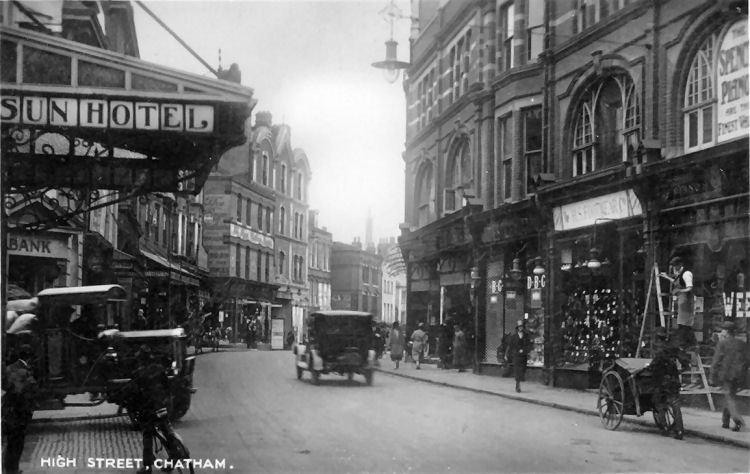
Above postcard, 1925. |
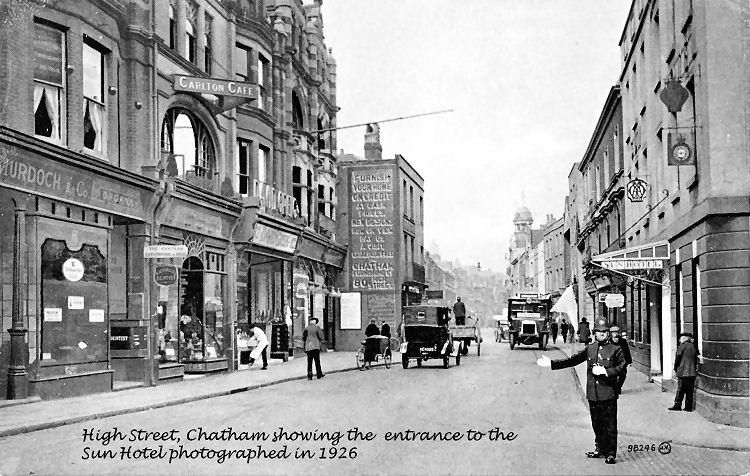
Above photo 1926 showing the entrance to the hotel on the right. |
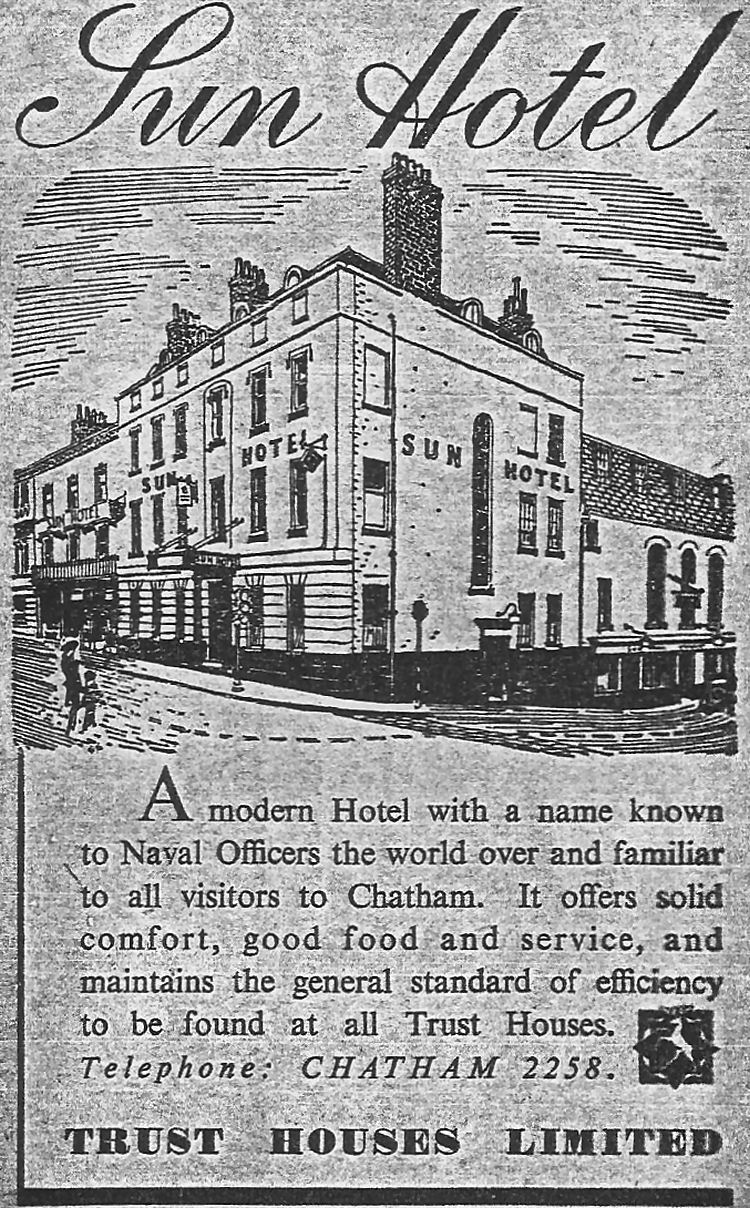
Above advert 1864. |
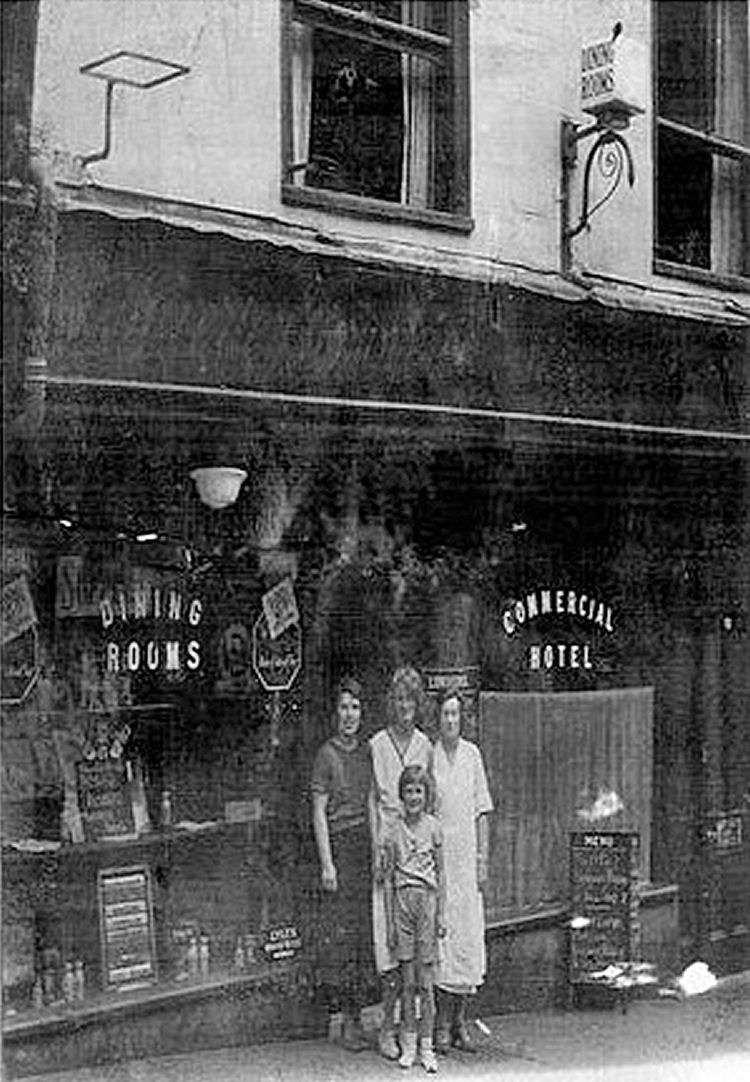
Above photo showing what was described as the "Commercial Hotel and
Dining Rooms" on the High Street, circa 1930s. |
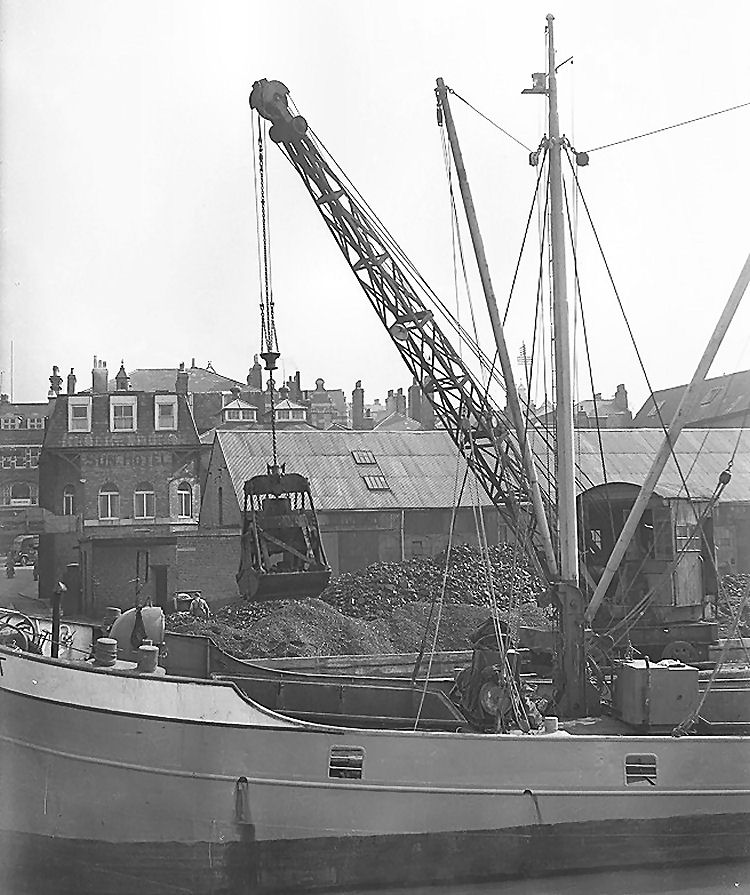
Above photo 1960. |
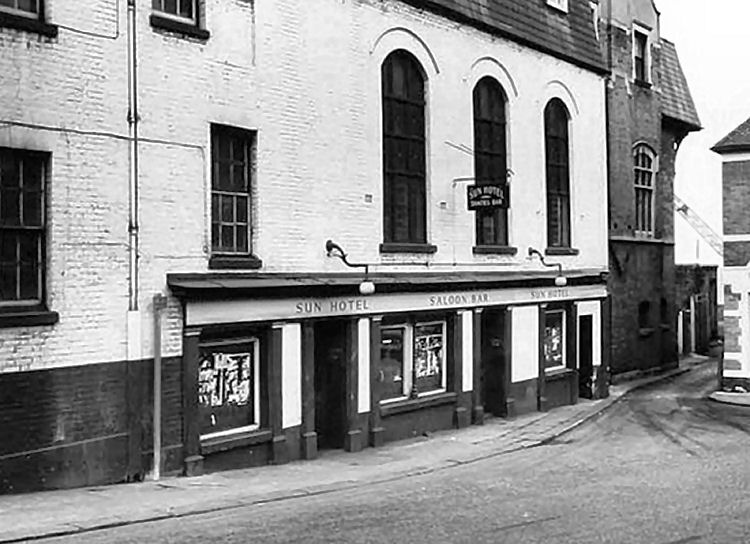
Above photo, date unknown. |

Above photo, date unknown. |
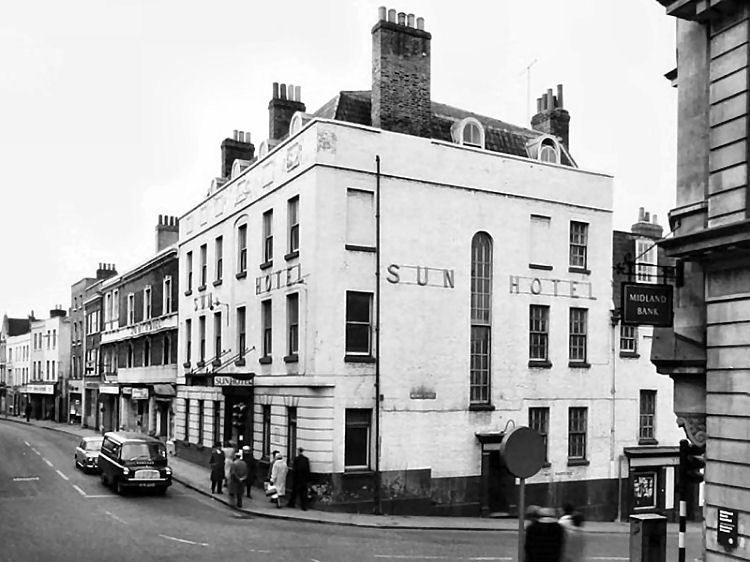
Above photo, circa 1965. |

Above photo, 1968. |
The Medway Archives and Local Studies Centre has referenced a set of
documents, that I haven't seen yet, and is part of the Watts Charity MSS,
1579-1972.
Reference is made as follows:-
1815-1892
T38. Premises at Chatham, Maidstone and Milton-next-Sittingbourne
[including land next to the "Sun Tavern;" The "Globe
Hotel;" The "United Service;"
The "Criterion" beershop; the "Red
Lion;" and cafe, formerly the "General
Havelock," all in High Street, Chatham; land, part of Room Lane Farm,
Old Maidstone Road, Chatham; Fant Farm, Maidstone; Church Field (29 acres).
Church Farm, Milton next Sittingbourne] (8 docs.)
The Licensing
Records of 1872 stated the premises held a Full License and was owned by
Edward Winch of Chatham.
I have reference to this pub from the Kentish Gazette or Canterbury
Chronicle September 1768, when the paper advertised the sale of household
furniture at Minster Abbey, on the Isle of Sheppey. It was stated that
catalogues could be obtained from this public house.
See Notes of 1768.
It appears that the original premises were totally destroyed by a fire in
1820, along with the "King's Head," and "Crown and Anchor."
Details below.
|
Kentish Gazette, 16 July, 1774.
"Sun Tavern," Chatham, July 15th, 1774.
Thomas Champion begs leave to acquaint his Friends, that being
greatly distressed by the late dreadful fire, was
thereby rendered incapable of proper Accommodations, as usual; but
has used his upmost endeavours in having
fitted up his House and Stables in the best Manner, for the
Reception of his Customers, whose Favours shall
ever be most gratefully acknowledged in every Respect.
|
|
Kentish Gazette 10 January 1778.
John Aldersley, Late Servant to Mr. Farley, of the "Fountain Inn,"
Canterbury, begs leave to acquaint his friends and the public in general, that he
has taken the "Sun Tavern," at Chatham, in Kent.
Late in the Occupation of Mrs. Champion.
He has laid in a fresh stock of Wines of all sorts, with a good Larder,
pleasant Lodging Rooms open to the River Medway, with a fine prospect to
his Majesty's Dockyard.
Those Gentlemen, who please to favour him with their Commands, may
depend upon the best Accomodations, which will be gratefully
acknowledged, and esteemed by their most humble Servant at Command. John
Aldersley.
Neat Post-Chaises, with able Horses and careful Drivers.
|
|
Kentish Gazette, 3 January, 1792.
On Tuesday night last, about half past 11 o'clock, Mr. Greenwood of
the Stamp Office, London, went to the "Sun
Inn," at Chatham, where he supped and went to bed; at about 10:30
next morning, the charwoman heard a
pistol go off in his bedroom, and ran to the door, which was locked;
she called for assistance, and the door was
broke open, when they found he had shot himself with a pistol by
putting it in his mouth.
The Coroner's inquest sat on the body the same day, and brought in
their verdict Lunacy.
He was interred on Saturday evening. Mr. Greenwood had slept at the
above house three nights in the
preceding week.
|
|
Kentish Chronicles, 22 December, 1795.
A letter from Chatham informs us, that on Wednesday night, about 9
o'clock, a terrible riot happened at the "Sun Inn," caused by some
young officers of the Marines quartered in the lower Barracks; who,
in a bit of intoxication, insisted on being admitted into the
Assembly room, where the principal inhabitants of the town,
according to monthly custom, were met to partake of the diversions
of dancing and cards; as, however, they received a peremptory
refusal, they ill-treated both Mr. and Mrs. Gurr, the master and
mistress of the Inn. This so aggravated the company in the house,
that they formed a resolution of taken away the offices swords or
hangers, which they, with care, completely accomplished, and an
Irish officer had his sword entirely broken to pieces. Then then
sent to the barracks for a picquet guard, but the Commandant,
Colonel Innis, sent an officer, of superior rank, to investigate the
affair; when the officers were reprimanding, and ordered to
disperse.
|
|
Kentish Gazette 3 March 1801.
Last week died at Chatham, Mr. Nelson, of the "Sun Tavern."
|
|
Kentish Gazette, 7 March 1820.
We are exceedingly concerned to state that the town of Chatham has
been visited by one of the utmost destructive
fires which it ever experienced. The conflagration commenced about
two o'clock on Friday morning at the house of Mr.
Hill, a baker, residing at 69, High-street. Before any assistance
could be afforded, it had gained such strength as to put
an end to all hopes of saving Mr. Hill's house, or that next to it,
with which the flames had almost immediately
communicated. The attention of those who first came to the spot was
then directed to the adjoining houses, and those
opposite, towards which the flames were driven by a violent North
Westerly wind, which continue to blow strongly until
a late hour in the morning. From Mr. Hill's house, and from those of
Mr. Watson, a linen Draper; of Mr. Cohen, a
pawnbroker; and two or three others which intervened, the devouring
element reach the "Sun Tavern," a very
extensive pile of building, and the principal Inn at Chatham. When
this house caught fire the scene was most awful,
the flames had been driven by the violence of the wind, to the
opposite side of the street, which then presented to the
eye a pile of burning buildings, between which, from the narrowness
of the place, the passage was in some places impassable, and, in all extremely dangerous. About half-past four or
five, the roof of the "Sun Tavern" fell with a
tremendous crash, and shortly after only a very small part of the
walls were still standing. At one time the brewery of
Mr. Best was thought to be in such danger that it's otter rain was
looking upon as inevitable; providentially, however,
by the prompt assistance of great numbers of the town's people,
aided by the active exertions of the military, it
escaped with comparatively trifling danger. Mr. Best was not so
fortunate with respect to his dwelling house, which,
with several adjoining houses, also his property, were entirely
consumed. The walls of Mr. Best's house were, from
their great solidarity, the only parts which were not levelled with
the Earth. At four, and between that and six o'clock,
the confusion which resigned in the town was beyond description.
From the appearance of the flames at the latter
hour, it was thought that all the houses south-east of that where
the fire began, would fall a sacrifice to its rage. So
strong was this impression, that many families, considerably removed
from the immediate scene of danger, had taken
down there bedsteads and other articles of furniture, and had
removed a large part of them to a still greater distance.
About 11 o'clock, the fury of the flames was checked by the partial
destruction of some houses on the same side of the
street where it began, and by the total demolition of one or two on
the opposite side, which the flames of not then
reached, but which were judged proper to take down, to prevent the
further spread of the configuration. The whole
number of houses destroyed in High Street is 38; and there were
several small buildings destroyed in the rear of each.
The violence of the wind was such that large flakes of burning
matter were conveyed to some 100 yards' distance. One
of those flakes fell upon a large stack of hay about 150 yards from
High Street, which consumed that, and two others,
which were close by. There was a considerable quality of hay
besides these stacks, which fortunately escaped. From
the extraordinary rapidity with which the flames spread, and the
danger of which threatened, in a narrow street, both
sides of which, for a great part, on fire, and immensity of property
was destroyed, which, had the weather been more
mild, might have been saved. Several houses, and those principally
belonging to persons whose ruin must be the
consequence, are wholly uninsured. It is, however, a satisfaction,
and relating this melancholy accident, to be able to
state that no life was lost on the occasion. One or two persons were
hurt by the falling of a wall, but not dangerously.
At an early hour of the day the news of the fire reached London,
from which some engines were dispatched; but
before their arrival the flames had been nearly subdued. The engines
from Rochester and Maidstone on on the spot as
soon as possible after the accident had reached those places. The
Sun fire engine, drawn by 6 horses, reached
Chatham at 6 in the afternoon. Great inconvenience was experience
from the wants of a plentiful supply of water. In
some places it was conveyed in casks to the spot where the engines
were at work, and there emptied into the street. The fire is supposed to have originated from the carelessness of one
of the baker's men, who carried out some hot
ashes, which he emptied near a rick of faggotts, and which was
fanned into a blaze by the excessive high winds.
This is the third severe visitation by fire which Chatham has
experience within the last half-century. About 20 years ago
a fire broke out nearly in the same place as the present one, which
consumes nearly 70 houses; and about 22 years
before that period a fire happened in the same street, to which 80
or 90 houses fell a pray.
Another Account.
The following are some further particulars which we have learned.
The family of Mr. Hill, at whose house the configuration commenced,
and also that at the "Sun Tavern," had merely
time to snatch a few garments, so rapid was the progress of the
flames, there being only two small engines, that
belong to the town, and a private one. When the flames reached
Best's brewhouse, a large stone fronted building, the
engines were supplied, owing to the scarcity of water with beer, to
the amount of nearly 100 butts. The wind blew with
considerable fury, and both sides of the street, which is very
narrow, being in flames at the same time the falling ruins
rounded it dangerous for persons to pass, or to render assistance.
The watch-houses and places of confinement, it is
lamentable to add, were filled with the lower order of townsfolks,
who took advantage of their neighbours' distress and
got intoxicated at their expense; and such was a scene of distress,
that nothing less than the utter ruin of the town was
expected. On the side of the High Street, next the Medway, there are
about 15 houses destroyed. On the opposite side
about 12, besides the number of courts and alleys.
The letter of a correspondent gives the following as a correct list
of the person whose houses have been destroyed and
much damaged by the dreadful configuration.
On The North Side.
Mr. Schnebbelie, confectioner, Mr. Benjamin; Mr. Hills, baker; Mrs.
Burdett, tallow chandley; Mr. Watson, ironmonger;
"Crown and Anchor;" Mr. Cohen, pawnbroker;
Mr. Hall, tailor; "Sun
Tavern," Mrs. Etherington, stationery; Mr. Whitehead, sadler; Mr. Fisher, draper; Mr. Stronghill, glazier;
"Kings Head," entirely destroyed.
Mr. Hendy, breeches maker, Mr. Large, shoemaker, Mr Williams,
draper, Mr. Delasour, silversmith, much damaged.
On The South Side.
Mr. Catchpool, draper; Mr. Thompson, grocer; Mr. Crockford, cabinet-maker; Mr. Poole, hatter; Mr. Harris, green-grocer; Mr. Hawkins, fishmonger; Mr. Appleby, stay-maker; Mr. Pye,
butcher; Mr. Frid, pawnbroker; Mr. G. Miller; Mr.
Matthews, tailor; Mr. Brittain, hair-dresser; Mr. E. Wickham; Mr. H. Wickham; entirely destroyed.
The mansion of J. Best esq. burnt and Brewhouse very much damaged.
Mr. Godfrey, surgeon, Mr Bishop, grocer; Mr. Lucas, slopseller; Mr.
Ray, butcher; Mr. Davis, ironmonger; very much damaged. Several small houses and back premises on both sides the way, burnt
down, it is supposed that £100,000 will not repair
the loss.
|
|
Kentish Gazette, 29 March 1803.
SUN TAVERN, CHATHAM, March 25, 1803.
J. GURR returns his sincere thanks to his friends and the public in
general, for the many favours conferred on him during his residence
at the above inn, and intending to decline the business of the same,
respectfully presumes to recommend Mr. W. Ashenden his successor.
WILLIAM ASHENDEN, with the greatest respect, informs his friends,
and the public in general, that he has taken the above inn, and
humbly hopes, by a strict attention to business, to merit that
patronage and support which his predecessor has so liberally
experienced.
A Glass Post-coach, neat Post-chaises and able horses. — The Stage
Coaches to London four times a day.
|
|
From the Kent Herald, 18 November 1824.
Wanton Cruelty.
A few days since, during the performance of signor Blitz, at the "Sun
Tavern," Chatham, the company were much amused by the familiarity of a tame
pigeon, which was running amongst them. Shortly afterwards the bird was found
with its head wrong off, and which it appears had been done by a soldier, whose
cruelty excited the utmost indignation in the audience
The bird was valuable, having been taught to bear a part in the performance.
How this brute in human shape is to be dealt with we have yet to learn.
|
|
Kent Herald, 14 July 1825.
Chatham Races.
Being fixed for the third, fourth., and fifth, of August next, Thomas Rickman of
the "Sun Tavern" and "York Hotel," takes this opportunity of informing his
friends and the public, that the first public dinner will be held at his house
on Wednesday, the third instant and assures them that every attention shall be
paid to the accommodation and comfort of his guests.
T. R. Has provided extensive additional stables for the occasion.
|
|
Kentish Chronicle, 11 August, 1829.
On Wednesday last a trial took place at the "Sun Tavern," Chatham,
before F. Whitemarsh, Esq., one
of the Commissioners of Lunatics, assisted by John Gibbs and Edward
Twopeny, Esqrs., arising out of
the following circumstances:-
A young lady named Chapman, who we understand had formerly been
confined in the private Lunatic
Asylum, at Town-Malling, was living under the care of her aunt, Mrs.
Groombridge, at Chatham. An
individual, having 9 children by a deceased wife, and living on
terms of intimacy with Mrs.
Groombridge, succeeded in marrying Miss Chapman, in the month of June
last, removed her from the
care of her aunt, and was concealed with her several weeks from the
knowledge of her friends. They,
however, to defeat the sordid intentions of her husband, sued out of
commission of lunacy in the
Court of Chancery, and a jury was empanelled on Wednesday to try the
sanity of the young lady. A
number of witnesses were examined on both sides, chiefly medical
gentleman. For the young lady
there were examined Mr. Smith, Dr. Perfect of Town-Malling, and
Messrs. Godfrey and Seaton,
surgeons. The sitting was commenced at 9 o'clock on Wednesday
morning, and continued until 4
o'clock on the following morning, when the jury returned a verdict -
"That the young lady was of
unsound mind, and incapable of managing her affairs." The result
will therefore be as usual in such
cases, - she will be placed under a guardian appointed by the Court
of Chancery.
|
|
From the Kent Herald, 29 August 1833
Rochester, Chatham, &c.
On Monday morning, between three and four o'clock, a fire was discovered
in the kitchen of the "Sun Tavern," Chatham, which did not spread
fortunately beyond that parts of the premises.
|
|
From the Kentish Gazette, 19 December 1837.
On Friday morning last the 15th inst. a man of the name of Evans, in a
state of intoxication, was unfortunately drowned at the
"Sun Inn," Hard, Chatham. A jury sat on the body the following day, at
his residence, in Ordnance Place, before R. Hinde, esq. the
coroner, and a verdict was returned of "Found drowned.”
|
|
From the Kentish Gazette, 17 September 1839.
(ANOTHER ACCOUNT).
On Monday last Madame Panormo had announced a concert to take place at
the "Sun Inn." However, the awfully sudden death of her husband, which
took place that day, deprived the inhabitants of the performance. It
appeared that the gentleman's death took place in one of the rooms where
he was lodging, which was on St. Margaret's Bank, Rochester, and that he
had been in excellent spirits throughout the day. He was watching the
arrival of the vans from Gravesend, as his son, who was coming from
London to take part in the performances of the evening, was expected by
one of them; and having caught sight of him, he exclaimed, "here he is,"
when he instantly fell down dead. A coroner’s inquest was held on
Wednesday, at the "Nag's Head, before R. Hinde, Esq., touching the death
of the deceased, when the jury, after a patient investigation, returned
a verdict of "Died in a fit of apoplexy."
|
|
From the Kentish Gazette, 1 February 1842.
ROCHESTER AND CHATHAM.
On Saturday a public meeting was held at the "Sun Tavern," Chatham, the
High Constable in the chair, for the purpose of considering the best
mode of celebrating the christening of the Prince of Wales. It was
proposed to have a public dinner on that day at the "Sun Tavern;" and
also suggested that the inhabitants should close their shops, and that
business be suspended.
|
|
From the Kentish Gazette, 11 June 1844.
DEATH.
May 28, at Chatham, Mrs. Winch, mother of Mr. E. Winch, of the “Sun
Tavern,” in that town, aged 62.
|
|
From the Kentish Gazette, 10 November 1846.
CHATHAM, Nov 3.
Alarming Accident to Capt. Scott and his Lady.
A frightful accident occurred yesterday afternoon in the High-street of
this town, by a dray, drawn by two powerful horses, which had run away
from the lower part of Chatham, and taking the course of the
High-street, just as Captain John S. Scott, of the 31st Regiment,
accompanied by his lady, was driving in an open carriage drawn by two
spirited horses. The dray came in contact with the hind wheels of the
carriage, which forced it round, and the concussion threw Captain Scott
and his lady into the road with much violence. The horses, with part of
the dray, proceeded with alarming velocity towards Rochester, upsetting
everything in their way, and the horses of Captain Scott’s carriage
started off down Chatham, and came in contact with a cart laden with
coals, the force of which caused the body of the carriage to separate
from the pole, and the horses being uncontrolled, one of them (a
valuable animal worth 80 guineas) was so severely hurt that it was taken
to the stables of the "Sun Hotel," where it died this this morning.
Captain Scott and his lady were promptly taken into the "Sun Hotel," and
were attended immediately by Mr. A. Robertson, surgeon; several military
medical officers were also quickly in attendance. Owing to the severe
contusions about the legs and body of Captain Scott, it was deemed
expedient to remove him to his residence, at Brompton, and he was taken
to the carriage in the arms of three serjeants of his regiment. It is
hoped that no bones are broken. Mrs. Scott fortunately escaped unhurt.
The dray and horses were the property of Mr. Woodham, of Strood.
|
|
South Eastern Gazette, Tuesday 31 May 1859.
CHATHAM AND GILLINGHAM, KENT.
Mr. J. T. Skinner,
HAS received instructions from the Proprietor to SELL by AUCTION, at the
"Sun Hotel," Chatham, on Wednesday, the 15th June, 1859, At five o'clock
in the evening, The following valuable FREEHOLD ESTATES, in seven lots,
vis.
Lot 3.— Two brick and tiled DWELLING-HOUSES, with outbuildings in
rear, and valuable piece of BUILDING LAND, at the north side thereof,
situate opposite the "Plough"
public-house, Upper Britton-street, New Brompton, Gillingham, Kent, and
now in the tenures of John Shorter and James Southgate, at weekly
rentals amounting to £12 11s. 4d. per annum (less rates and taxes).
Lot 5:— A brick and slated DWELLING-HOUSE, containing 5 rooms, washhouse
and cellar, together with the outbuildings, front and back gardens, and passage-way at side, situate adjoining the "Lord Exmouth" public-house,
Exmouth terrace, Gillingham, now in the tenure of Richard Sears, at an
annual rental of £8 (tenants paying rates and taxes).
|
|
From the Southeastern Gazette, 1 May 1866.
Preliminary Notice of Sale.
Messrs. COBB HAVE received instruction from the Executors of the late
Mr. Joseph Ashley, to SELL by AUCTION, in the month of June, at the “Sun
Hotel,” Chatham.
The valuable FREEHOLD and LEASEHOLD PUBLIC-HOUSES, BEER-HOUSES, TRADE
PREMISES, DWELLING HOUSES, &o., viz;-
The "Cock" Public-house, in the
High-street, Rochester, with shop adjoining, and cottages and garden in
the rear.
The "White Lion," High-street, Chatham.
The "Wellington," on the New-road, Chatham.
The "Hen and Chickens," Luton, Chatham.
The "Hook and Hatchet," Chatham.
The "Three Brothers," Slicketts-hill, Chatham.
The "Prince of
Wales," Hards Town, Gillingham.
The "Lord Nelson," Brompton, Chatham.
The "Plough and Chequers," Gillingham.
The "Red Lion," Snodland.
The "White Horse," and land (at Poundgate), in the parish of Laddesdown.
The Residence of the late Mr. Ashley, with spacious trade premises, in
the High-street, Chatham. Also, an improved Rent on Leasehold Property
adjoining. The Dwelling-house, No. 24, Gibraltar-place, Chatham.
Two Houses adjoining the Luton-road, called St. Leonard’s Ville. Nos. 1,
3, 5, and 6, Bethesda-place, Henry-street, Chatham. Nos. 1 and 2,
Providence-place, Henry-street, Chatham. Nos. 24, 52, and 53,
Henry-street, Chatham. Nos. 8, 40, and 41, Newnham-street, Chatham.
Leasehold Shop and Dwelling-house, adjoining the “Wellington” Public-
house, New-road, Chatham.
SHEERNESS AND ISLE OF SHEPPEY.
The "White Swan," High-street, Blue Town, Sheerness.
The "Crooked
Billet," Eastchurch.
Further notice as to time, &c., of sale will shortly issued.
Particulars in the meantime may be obtained of Messrs Acworth and Sons,
Solicitors, Star-hill, Rochester; of Messrs. Morris, Stone, Townson and
Morris, Solicitors, Moorgate-street Chambers, London; and of Messrs,
Cobb, Surveyors and Land Agents, 26, Lincoln s Inn-fields, London, and
Rochester, Kent.
|
|
From the Southeastern Gazette, 22 May 1866.
COUNTY PETTY SESSIONS.
Wednesday. (Before W. H. Nicholson, Esq., and Captain H. Savage.)
William Sutton, a rather respectably dressed young man, who said he had
recently arrived from Canada, was charged with an hotel robbery.
The charge now taken against the prisoner was that of having stolen a
great coat from the “Sun Hotel,” the property of Mr. John Bennett, a
commercial traveller, residing at Wells-street, Hackney.
The prosecutor said he was stopping at the “Sun Hotel,” and left his
coat hanging up inside the commercial-room. Whilst in the room writing
he saw the prisoner walk in and take it off the peg, but the witness,
not thinking for the moment that it was his coat, took no notice of him,
and went on writing his letters. In a minute or two afterwards the
prosecutor had occasion to go to his coat for some halfpence, and then
found that it had been stolen. He immediately gave Information to the
waiter, and on going into the street found the prisoner in the custody
of police-sergeant Morgan, with the coat in his possession. The prisoner
said it was all a mistake, but the prosecutor pointed out to him that it
could not be a mistake, as there was no other coat in the room. When the
prisoner came in he asked for a glass of sherry and a cigar. The coat
was worth 30s.
Police-sergeant Morgan said he received information that a coat had been
stolen from the “Sun Hotel,” and in a few minutes after met the prisoner
walking through High-street with the coat produced hanging on his arm.
Witness asked him if the coat belonged to him, when prisoner replied
“Yes, it is my coat.” The witness then told him he must go with him to
the “Sun Hotel,” on which prisoner looked at the coat and remarked “Oh,
I have made a mistake; it isn’t mine.” Prisoner also said he had a great
coat of his own which he had left at an eating-house where he was
stopping. The coat produced witness afterwards found at the coffee-house
described.
Supt. Everist said the prisoner whilst at the station said it was quite
a mistake. On searching the prisoner he found on him a railway check for
a parcel left at the cloak-room at the Chatham station. On this bundle
being obtained from the railway station, and opened in the presence of
the prisoner, it was found to contain a great quantity of miscellaneous
property, which had evidently been stolen. The prisoner then said he
would tell the truth, and then informed the superintendent that he had
been “on the loose” for about three months, and had stolen the coat he
had on the previous night. He also stated that he had been so many times
in liquor that he did not know what he had done.
Among the articles in the bundle were nearly a hundred pairs of gloves,
a quantity of silk handkerchiefs, and a large number of pocket-books,
besides other articles, which had evidently been taken from the pockets
of gentlemen’s coats which he had stolen. None of the pocket-books or
papers had any names whereby the owners could be ascertained. One of the
pocket-books in the bundle contained a bank note for £100, but from its
position in the book it had evidently been overlooked by the prisoner,
who had evidently earned on a wholesale system of robberies from hotels.
The prisoner, who pleaded guilty, was sentenced to three months’ hard
labour.
|
|
SUMMARY OF OBITUARY IN CHATHAM OBSERVER.
Henry Spurrier died of complications following surgery. He had lived in
Chatham only for five years, taking over the "Sun Hotel", Chatham, in
1884. Before this he ran an hotel at Deal, ("The Black Horse"), prior to
this he was in the slate business at Folkestone.
His time at the "Sun" was so successful that he purchased the freehold
recently, he had also run the "Mitre Hotel", also in Chatham.
Six years before his death, he was elected to Chatham Council for St.
Mary's Ward, he was a Conservative, but not dogmatically so. He was for
some time on the Board of Guardians; he was a Director of the Rochester
and Chatham Savings Bank and a Director of the Chatham Constitutional
Club.
Tribute from the Mayor of Chatham, ".....not only had the family been
deprived of a good husband and excellent father, but the Borough had
lost a good citizen, whose memory would be cherished by his colleagues
on the council and by his brother tradesmen ("hear, hear")"
|
The pub also housed the "Sun Tap" at the rear.
Pigot's Directory of 1828 called the premises the "Sun Tavern and York
Hotel."
In 1927 a new building was erected to the right hand side of the
original.
According to the book called "Royal Bastards" by Peter Beauclerk-Dewar
and Roger Powell, the eldest bastard of George IV lived at the "Sun Hotel,"
Chatham after he quit the army in approx 1831 after the King died, and lived
the rest of his life there.
LICENSEE LIST
CHAMPION Thomas 1774+
CHAMPION Mrs to Jan/1778

ALDERSLEY John Jan/1778+

GURR John 1793-25/Mar/1803

ASHENDEN William 25/Mar/1803+
GREENSTREET William 1828-32+
  (Sun, High Street)
(Sun, High Street)
RICKMAN Thomas 1825-28+
 (Sun Tavern and York Hotel)
(Sun Tavern and York Hotel)
BIRCH Henry 1832+
 (Sun Tavern and York Hotel)
(Sun Tavern and York Hotel)
WINCH Edward 1838-64+
(also brewer and wine merchant age 53 in 1861 ) )

WILLIS William 1872-82+ (age 60 in 1881 ) )

 SPURRIER Henry 1884-91+ (age 49 in 1891
SPURRIER Henry 1884-91+ (age 49 in 1891 ) )
DOWLAND Douglas 1911-13+ (age 45 in 1911 ) )
TRUST HOUSES Ltd 1938-55+
https://pubwiki.co.uk/SunHotel.shtml
http://www.closedpubs.co.uk/sun.html
 Kentish Gazette Kentish Gazette
 Universal
British Directory of Trade 1793 Universal
British Directory of Trade 1793
 From the Pigot's Directory 1828-29 From the Pigot's Directory 1828-29
 From the Pigot's Directory 1832-33-34 From the Pigot's Directory 1832-33-34
 Wright's
Topography 1838 Wright's
Topography 1838
 Licensing
Records 1872 Licensing
Records 1872
 Census Census
|








